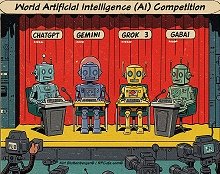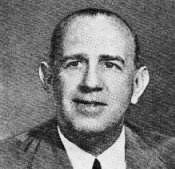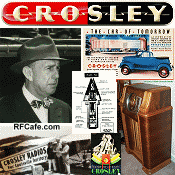Electronics Pioneers & History
- See Full List of AI Topics -
Powel
Crosley Jr., an American inventor, entrepreneur, and industrialist, was born
on September 18, 1886, in Cincinnati, Ohio. He became one of the most prolific figures
in American industry, with contributions spanning from radios to cars, and from
kitchen appliances to television broadcasting. His innovative spirit, coupled with
a keen business sense, enabled him to leave an indelible mark on American consumer
culture during the first half of the 20th century.
Crosley's early years were shaped by a supportive,
middle-class family. His father, Powel Crosley Sr., was a successful attorney, which
afforded young Powel and his siblings a comfortable upbringing. Crosley was drawn
to mechanical and electrical engineering from an early age, demonstrating an innate
talent for tinkering. As a boy, he built his own working model of a car, though
his attempts to produce it commercially failed. Despite these early setbacks, Crosley's
determination to innovate and commercialize new ideas never wavered.
He attended the University of Cincinnati to study law, but his real passion remained
in engineering and mechanics. Eventually, Crosley left college to pursue his entrepreneurial
ambitions, a decision that would set him on a path toward becoming a major industrialist.
His first ventures, however, were not immediately successful. Crosley tried his
hand at several businesses, including an early attempt at manufacturing automobiles,
none of which gained significant traction. Nonetheless, these failures provided
valuable experience and laid the groundwork for his future successes.
In 1920, Crosley's fortunes changed when his son, Powel Crosley III, asked for
a radio set. Radios were still rare and expensive at the time, costing hundreds
of dollars, which was beyond the budget of the average American family. Rather than
buy one, Crosley decided to build a radio himself, realizing during the process
that there was an untapped market for affordable radios. This insight led to the
founding of the Crosley Radio Corporation, a venture that would not only make him
wealthy but would also revolutionize home entertainment in America.
Crosley's goal was to manufacture radios (Crosley Radios:
A Brief Overview and Historical Context ) that the average American family could
afford. His company introduced the "Harko," a small, inexpensive radio receiver
in 1921, followed by a series of increasingly popular models. The company's
Model
03CB console radio became one of its most famous designs, known for its affordability
and reliability. Crosley radios became a household name, transforming radio from
a luxury item into a common fixture in American homes. His success in the radio
market earned him the nickname "The Henry Ford of Radio."
Crosley's involvement with radio did not stop at manufacturing sets. In 1922,
he founded WLW in Cincinnati, which eventually became one of the most powerful AM
radio stations in the world. By the mid-1930s, WLW was broadcasting at an unprecedented
500,000 watts, far more powerful than any other U.S. station. The station, which
came to be known as "The Nation's Station," allowed Crosley to both promote his
products and influence the growth of the medium. The station helped popularize many
radio shows and was instrumental in launching the careers of numerous entertainers.
Beyond radios, Crosley's inventive mind turned to other consumer goods. His
interests were wide-ranging, and he sought to improve everyday household items
with the same entrepreneurial energy that he applied to radios. In the 1930s,
Crosley introduced the
"Shelvador" refrigerator, the first refrigerator to feature shelves in the door
- a
concept that revolutionized kitchen appliance design and remains a standard in refrigerators
to this day. The Shelvador was a commercial success and further solidified Crosley's
reputation as a visionary in consumer goods.
Crosley's ventures extended beyond the home. In the late 1930s, he turned his
attention to the automobile industry once again, founding the Crosley Corporation.
He aimed to produce small, affordable cars that were fuel-efficient and practical.
In 1939, he introduced the Crosley car, a subcompact vehicle at a time when most
American automakers were focused on large, luxury models. Crosley's cars were marketed
as economical and accessible to a broader range of consumers. Although the vehicles
never achieved mass-market success, they remain iconic in automotive history as
some of the first compact cars.
During World War II, Crosley pivoted his company to support the war effort, producing
military equipment such as field radios and proximity fuses. His contributions to
military technology were significant, as his company developed devices that helped
improve battlefield communications. Crosley's factories, which had once produced
radios and appliances, were now turning out critical wartime materials, reinforcing
his ability to adapt his businesses to meet national needs.
Crosley's financial success was largely self-made. The radios, appliances, and
cars his companies produced generated considerable revenue, though not all ventures
were equally successful. His car company, for instance, struggled to compete with
larger automakers, and despite its innovative designs, it was forced to cease production
in 1952. Similarly, Crosley's television sets, which were introduced in the late
1940s, failed to capture the same market dominance that his radios had enjoyed.
By the early 1950s, competition from larger, more established television manufacturers
like RCA and Philco pushed Crosley out of the television market.
Despite these setbacks, Crosley remained resilient. He continued to invent and
innovate, holding over 100 patents across a variety of industries, from radio technology
to automotive designs. His inventiveness and business acumen led to numerous successful
product launches, even if not all of them resulted in lasting enterprises. For instance,
Crosley briefly ventured into the manufacture of trucks during the 1940s, producing
small utility vehicles that were popular with farmers and small businesses. Like
his cars, Crosley's trucks were known for their fuel efficiency and affordability,
but they were unable to compete with larger, more established manufacturers and
were eventually discontinued.
Crosley's career was not without legal challenges. His aggressive approach to
business often brought him into conflict with competitors, and his companies were
occasionally embroiled in patent disputes. One notable lawsuit involved his radio
business, where rival companies accused him of infringing on certain radio patents.
While Crosley defended his innovations, the legal battles consumed time and resources,
further complicating his attempts to maintain market dominance in an increasingly
competitive environment.
Powel Crosley Jr.'s legacy also includes his involvement in sports. In 1934,
he became the owner of the Cincinnati Reds, a Major League Baseball team. Crosley
was a passionate baseball fan, and under his ownership, the Reds enjoyed renewed
success, winning the National League pennant in 1939 and 1940, and the World Series
in 1940. Crosley Field, the Reds' ballpark, was named in his honor and became a
beloved landmark in Cincinnati sports history.
Crosley's personal life was characterized by hard work, a love for invention,
and dedication to his family. He married Gwendolyn B. Aiken in 1910, and the couple
had two children, Powel III and Page. Despite his many business interests, Crosley
was known to be a devoted father and husband. He and his family lived on a large
estate in Cincinnati, which included an extensive workshop where he continued to
experiment with new ideas.
Powel Crosley Jr. passed away on March 28, 1961, at the age of 74. By the time
of his death, he had transformed multiple industries and had made household names
out of many of his products. Although some of his ventures, like his car company,
did not survive long after his passing, his influence on radio broadcasting, kitchen
appliances, and consumer electronics remains evident to this day. His pioneering
work in making radios and household appliances affordable for the average American
was a major contribution to the democratization of technology. His radio station,
WLW, became a powerful voice in American broadcasting, and his innovations in the
automobile and kitchen appliance industries set standards that endured long after
his death.
Powel Crosley Jr. may not have had the enduring fame of some of his contemporaries,
but his entrepreneurial spirit, inventive genius, and dedication to producing affordable,
practical products left an indelible mark on American life during the 20th century.
His vision of bringing high-quality products to the masses and his ability to pivot
his businesses across multiple industries make him one of the most versatile and
impactful industrialists of his time.
 This content was generated by primarily
with the assistance of ChatGPT (OpenAI), and/or
Gemini (Google), and/or
Arya (GabAI), and/or Grok
(x.AI), and/or DeepSeek artificial intelligence
(AI) engines. Review was performed to help detect and correct any inaccuracies; however,
you are encouraged to verify the information yourself if it will be used for critical
applications. In all cases, multiple solicitations to the AI engine(s) was(were)
used to assimilate final content. Images and external hyperlinks have also been
added occasionally - especially on extensive treatises. Courts have ruled that AI-generated
content is not subject to copyright restrictions, but since I modify them, everything
here is protected by RF Cafe copyright. Many of the images are likewise generated
and modified. Your use of this data implies an agreement to hold totally harmless
Kirt Blattenberger, RF Cafe, and any and all of its assigns. Thank you. Here is
Gab AI in an iFrame. This content was generated by primarily
with the assistance of ChatGPT (OpenAI), and/or
Gemini (Google), and/or
Arya (GabAI), and/or Grok
(x.AI), and/or DeepSeek artificial intelligence
(AI) engines. Review was performed to help detect and correct any inaccuracies; however,
you are encouraged to verify the information yourself if it will be used for critical
applications. In all cases, multiple solicitations to the AI engine(s) was(were)
used to assimilate final content. Images and external hyperlinks have also been
added occasionally - especially on extensive treatises. Courts have ruled that AI-generated
content is not subject to copyright restrictions, but since I modify them, everything
here is protected by RF Cafe copyright. Many of the images are likewise generated
and modified. Your use of this data implies an agreement to hold totally harmless
Kirt Blattenberger, RF Cafe, and any and all of its assigns. Thank you. Here is
Gab AI in an iFrame.
AI Technical Trustability Update
While working on an update to my
RF Cafe Espresso Engineering Workbook project to add a couple calculators about
FM sidebands (available soon). The good news is that AI provided excellent VBA code
to generate a set of Bessel function
plots. The bad news is when I asked for a
table
showing at which modulation indices sidebands 0 (carrier) through 5 vanish,
none of the agents got it right. Some were really bad. The AI agents typically explain
their reason and method correctly, then go on to produces bad results. Even after
pointing out errors, subsequent results are still wrong. I do a lot of AI work
and see this often, even with subscribing to professional versions. I ultimately
generated the table myself. There is going to be a lot of inaccurate information
out there based on unverified AI queries, so beware.
Electronics & High Tech
Companies | Electronics &
Tech Publications | Electronics &
Tech Pioneers | Electronics &
Tech Principles |
Tech Standards Groups &
Industry Associations | Societal
Influences on Technology
|










